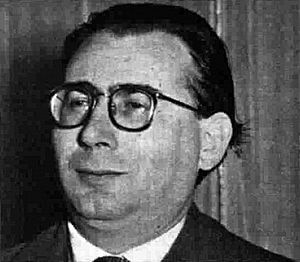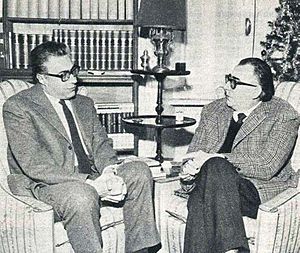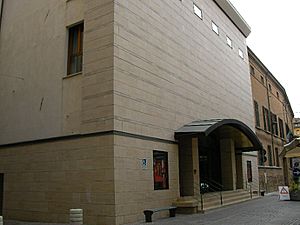Diego Fabbri facts for kids
Diego Fabbri (born July 2, 1911 – died August 14, 1980) was an Italian writer who created plays. His plays often focused on religious themes, especially those related to the Catholic faith.
Contents
Early Life and Writing Career
Diego Fabbri finished his studies at the University of Bologna in 1936. Even before that, he had started his writing journey. His very first play, The Flowers of Pain, was published in 1928. After that, he wrote The Node, but the government at the time did not allow it to be shown.
In 1938, he worked with Guido Chiesa on a play called Absent. The next year, Fabbri was invited to Rome. He became the director of a company called Publisher Avenue. Then, in 1940, he was chosen to be the secretary of the Catholic Film Center. He held this important job until 1959. During these years, Fabbri also started working on The Literary Fair. He worked on this project with the poet Vincenzo Cardarelli. This project was not finished until 1966, after Vincenzo Cardarelli had passed away.
Fabbri wrote many plays in 1940. That year, he wrote three plays: “Marshes”, “Meadow”, and “Fun”. The next year, he released “Orbits”. This play was performed at the Teatro Quirino in Rome. “Marshes” was also performed at the same theater in 1942.
Writing for Movies and Theater Leadership
One of Fabbri's most famous works is Inquisition, which he wrote in 1946. He began his career as a writer for movies by working with well-known directors. Some of these directors included Vittorio De Sica, Alessandro Blasetti, and Roberto Rossellini. He also worked with other famous filmmakers like Federico Fellini, Michelangelo Antonioni, René Clair, and Luis Buñuel.
Fabbri wrote the stories for many films. Some of them were Family Process (1953), The Liar (1954), and Trial of Jesus (1955). Other films he wrote for include Vigil of Arms (1956), Delirium (1957), and The Event (1967).
From 1960 to 1962, Fabbri was in charge of the Roman Theatre La Cometa. In 1968, he became the President of ETI (Italian Theatre). During his time there, he worked to help theater grow and become popular across Italy.
Fabbri really wanted to create theater for everyone in the country. He showed this by signing a special plan in 1943. This plan was called the manifesto for a theater of the people. He signed it with other important writers like Pandolfi and Pinelli. Fabbri also helped start the National Union of Drama Writers in 1945.
Diego Fabbri was born in Forlì, Italy. There is a theater in Forlì named after him. His most famous plays are Inquisizione (Inquisition) and Processo a Gesú (The Trial of Jesus). He passed away in Riccione in 1980.
Main Works
- Rancore ("Rancor", 1946)
- Inquisizione ("Inquisition", 1950)
- Processo di famiglia ("Trial of the family", 1953)
- Processo a Gesù ("The Trial of Jesus", 1955)
- La bugiarda ("The Deceitful Woman", 1956)
- Veglia d'armi ("Vigil of Arms", 1956)
Selected Movies He Wrote For
- The Ten Commandments (1945)
- The Gates of Heaven (1945)
- The Testimony (1946)
- Fugitive in Trieste (1951)
- The Corsican Brothers (1961)
- The Mysteries of Paris (1962)
- Destination Rome (1963)
See also
 In Spanish: Diego Fabbri para niños
In Spanish: Diego Fabbri para niños




